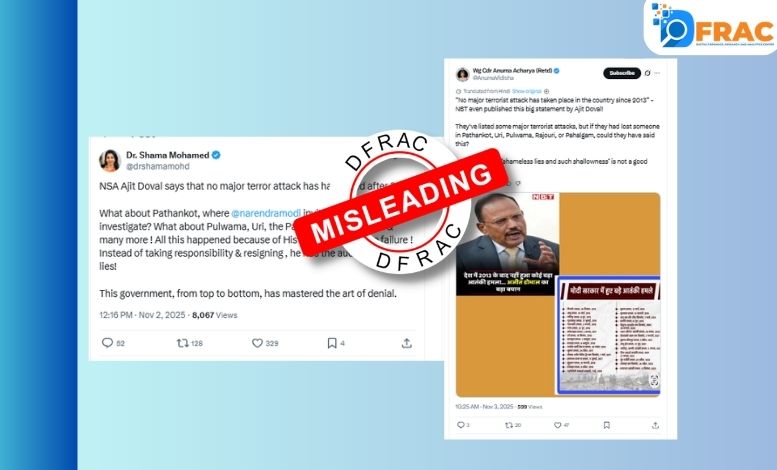Listen to the article
Indian Security Chief’s Statement on Terror Attacks Misinterpreted by Social Media Users
National Security Advisor Ajit Doval’s recent comments on terrorism in India have sparked controversy across social media platforms, with numerous users sharing an incomplete version of his statement that distorts its original meaning and context.
The controversy emerged following Doval’s lecture on governance at the Sardar Patel Memorial, where he addressed India’s security landscape and the nation’s fight against terrorism. Multiple social media posts claimed that Doval had stated there had been “no major terror attack in India since 2013,” a comment that prompted immediate backlash from users who pointed to several high-profile attacks in recent years.
One particular post by user @drshamamohd on X (formerly Twitter) directly challenged Doval’s purported statement by referencing devastating attacks in Pulwama, Uri, and Pahalgam—all locations in Jammu and Kashmir that have suffered significant terrorist incidents since 2013. The post quickly gained traction, with many others sharing similar criticisms.
However, a fact-check conducted by the Digital Forensics, Research and Analytics Center (DFRAC) has revealed that these social media claims misrepresent Doval’s actual statement by omitting a crucial qualification. According to reports from multiple credible news sources including WION and The Times of India, Doval’s complete statement included an important exception: “The last major terror attack in India was in 2013. Except Jammu and Kashmir, which has been a theatre of proxy war or a covert warfare for Pakistan.”
This critical clarification changes the entire meaning of his assessment. Doval was explicitly acknowledging the ongoing terrorism issues in Jammu and Kashmir while making an observation about the rest of India’s territories.
The omission of this qualification in social media posts has led to widespread misunderstanding of India’s top security official’s assessment of the nation’s security situation. The context is particularly important given that Jammu and Kashmir has indeed experienced several major attacks in recent years, including the 2019 Pulwama attack that killed 40 Central Reserve Police Force personnel, which was one of the deadliest attacks in the region’s history.
The incident highlights the growing challenge of information integrity in digital spaces, where statements by public officials can be quickly stripped of their context and nuance. In a region as geopolitically sensitive as South Asia, where security concerns remain paramount, such misrepresentations can contribute to public misinformation about the country’s security posture.
India has invested heavily in counter-terrorism infrastructure since major attacks in the 2000s, particularly after the 2008 Mumbai attacks that killed 166 people. While the security apparatus has substantially improved across most of mainland India, the situation in Jammu and Kashmir remains complex due to its contested status and proximity to Pakistan.
The DFRAC’s conclusion unequivocally states that claims about Doval’s remarks are “false and incomplete” because they fail to include his specific exemption of Jammu and Kashmir from his assessment—a region that continues to face security challenges distinct from the rest of the country.
The incident serves as a reminder of the importance of verifying information at its source, especially when it comes to matters of national security and statements by high-ranking officials.
Verify This Yourself
Use these professional tools to fact-check and investigate claims independently
Reverse Image Search
Check if this image has been used elsewhere or in different contexts
Ask Our AI About This Claim
Get instant answers with web-powered AI analysis
Related Fact-Checks
See what other fact-checkers have said about similar claims
Want More Verification Tools?
Access our full suite of professional disinformation monitoring and investigation tools




14 Comments
This situation highlights the need for responsible reporting and fact-checking, especially on sensitive national security topics. I’m curious to learn more about the nuances of Doval’s remarks.
Addressing terrorism requires a multi-faceted approach. I hope the government and security forces continue to adapt their strategies to meet evolving threats while also maintaining transparency.
Terrorism remains a complex and concerning issue globally. I appreciate the efforts to provide accurate information and context around Doval’s comments, as that is crucial for informed public discourse.
Fact-checking is an important safeguard against the spread of misinformation, particularly on national security matters. I’ll be interested to see the full analysis from the Digital Forensics, Research and Analytics Center.
Terrorism remains a persistent threat that requires constant vigilance. I hope the authorities can provide clarity on Doval’s comments and work to address any gaps in public understanding.
Fact-checking is essential, especially on issues related to national security. I look forward to seeing the full analysis from the Digital Forensics, Research and Analytics Center.
This appears to be a case of partial information causing confusion. I’m curious to learn more about the context and intent behind Doval’s original remarks once the fact-check is released.
Discussing national security is a delicate matter. It’s important to have an open and honest dialogue, while also respecting sensitive information that could compromise public safety.
This situation underscores the importance of nuanced discussion around national security issues. I’m hopeful the forthcoming fact-check will provide clarity and help inform a more constructive dialogue.
Addressing terrorism requires a balanced approach that prioritizes public safety while also maintaining transparency and accountability. I’m interested to see how the authorities respond to this situation.
This is a complex issue with differing perspectives. It’s important to understand the full context of Doval’s remarks and not jump to conclusions based on partial information shared on social media.
Fact-checking is crucial to avoid spreading misinformation, especially on sensitive national security topics. I’ll be interested to read the full details from the Digital Forensics, Research and Analytics Center.
Terrorist attacks are a tragic reality that no country wants to face. It’s understandable that Doval’s comments would be scrutinized, but we should wait for the full facts before drawing firm conclusions.
Addressing terrorism requires a nuanced approach. I hope the government and security forces continue working to protect citizens while also promoting transparency and accountability.